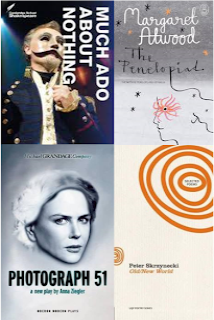English News

John Button School Prize 2020
The prestigious John Button School Prize awards the best essay on a subject concerning Australia’s future by a Victorian student who is in Years 10 to 12 and is younger than 19.
Nalini Jacob-roussety (Class of 2021) received the honour of being awarded runner-up for the 2020 John Button Prize, which she achieved by writing an insightful and imperative essay on the topic of sleep deprivation and fatigue in the Australian workforce. The judges commented that Nalini’s essay drew on “a diverse range of evidence to address an often - overlooked issue” and was “very coherently written and very engaging to read”. The essay is reproduced in full below, for you to enjoy for yourselves.
On behalf of the Creative Writing Club and the school community, congratulations to Nalini for her impressive accomplishment!
Biruntha Muhunthan (English Leader)
Year 12
Don’t Let the Bed Bugs Bite:
Tackling fatigue in the Australian workplace
While a global pandemic challenges Australia’s economic and social welfare, another detriment to the nation’s productivity and wellbeing slumbers beneath the surface.
The 2019 Parliamentary Inquiry into Sleep Health Awareness in Australia revealed the discrepancy between the importance of sleep health and safety, and the lack of any kind of uniform national policy. The effects of this discrepancy are especially prominent in the workplace, posing particular risks on Australia's roads and in the medical sector. While the average adult requires between 7 and 9 hours of sleep each night, 4 in every 10 Australians are not getting adequate sleep. (See Reference 1 in the attached list of Footnotes and References. References will be identified hereafter in the form "(Ref x)") This impairs performance in myriad ways, including by causing slower reaction times, reduced awareness, reduced concentration, poor judgement, reduced work efficiency, and periods of microsleep.(Ref 2) Thus, the risk of sleep deprivation must be addressed through national policy in order to safeguard the prosperity of Australia’s future: the time is now.
In a submission to the Parliamentary Inquiry into Sleep Health Awareness, Deloitte estimated that sleep deprivation resulted in 3017 deaths in Australia in 2016, and cost the economy approximately $66.3 billion.(Ref 3) Despite the Inquiry report having been tabled to Parliament, no further comment has been made regarding the adoption of recommendations. However, sleep health must become a national priority as Australia transitions to a ‘new normal’ beyond the pandemic, so that Parliament may mitigate the substantial productivity and wellbeing detriments caused by fatigue. By inquiring into legislation amendments, initiating public health campaigns, promoting flexible working hours, encouraging rest-breaks, and prioritising sleep, Parliament can induce a culture shift and increase in public sleep health awareness in Australia. Additionally, this will aid the nation in rehabilitating its economy from the recession induced by COVID-19 by addressing the underlying financial risks posed by a national lack of sleep.
Australia's negligent fatigue safety protocols in the workforce leads to accidents and reduced wellbeing. The Parliamentary Inquiry into Sleep Health Awareness found that 21% of men and 13% of women have fallen asleep at work in the past month.(Ref 3) Reduced alertness due to workplace fatigue results in nearly 10,000 serious workplace injuries in Australia each year (Ref 4). However, many industry awards continue to allow for shift workers to work upwards of 11 hours per day,(Ref 5) resulting in fatigue for many employees, particularly those on night shifts. Consequently, shift-workers sleep for an average of 2-3 hours less than those who work regular hours.(Ref 6) Because long-term fatigue significantly impairs awareness(Ref 2), increases the risk of cardiovascular disease, cancer and type-2-diabetes (Ref 7), and increases the risk of depression and anxiety (Ref 8), this significantly impairs safety and wellbeing. Shift-work can also have a higher impact on particular members of the workforce, including women and those from low socio-economic backgrounds. Women are especially susceptible to lack of sleep due to the domestic responsibilities they are often required to undertake, such as nursing infants, which results in a greater lack of recovery time between shifts.(Ref 3) Furthermore, those from low socio-economic backgrounds may be required to undertake greater travel to work due to a lack of private transportation, and those living outside capital cities generally have a greater commuting distance than metropolitan citizens,(Ref 9) allowing them less recovery time between shifts. Thus, the effects of rapid shift changes cannot be ignored.
To address such detriments, legislation such as the Fast Food Industry Award (2010) could be amended to provide uniform requirements such as a maximum number of consecutive night shifts. Businesses should be required to provide adequate rest breaks and staff amenities which facilitate this. In addition, modelling software may be used to allocate rosters and rest breaks which comply with safety standards for alertness at work.(Ref 3) This modelling software can be tailored to take into account individual characteristics such as distance travelled to work and domestic responsibilities, and efforts should be made to tailor work schedules to the individual, rather than encouraging cuts in hours or workplace discrimination based on particular characteristics. Screening for sleep disorders should be mandatory for professional drivers and machine operators, and treatment compulsory. These amendments will ensure that shift-workers attain the required sleep to function at their optimum level of awareness, whilst also boosting Australia’s overall productivity levels and decreasing the risk of fatigue-related work accidents.
The medical sector is one of the industries most impacted by sleep-loss. In a pilot study on the safety implications of a lack of sleep in the medical community, nurses reported struggling to remain awake during 36% of shifts, with significantly higher levels of medical errors on days with less sleep recorded. Additionally, extreme drowsiness while driving or cycling home was reported by nurses on 11.5% of occasions.(Ref 10) An audit of doctors working in public hospitals across Australia also found that 1 in 2 doctors are working unsafe shifts, placing them at significantly higher risk for fatigue and medical errors. Some of these doctors reported working shifts that exceeded 70 hours.(Ref 11) This is particularly concerning when it is considered that a sleep-deprived physician may be functioning at the same level of awareness as an intoxicated person with a Blood Alcohol Concentration (BAC) of 0.05% or higher while performing surgery on a patient.(Ref 12)
A system-level approach could see the implementation of education for healthcare providers on the importance of sleep, in order to dismantle the cultural norm of long hours in the medical sector. Sleep breaks should also be provisioned during medical shifts, and a safe environment to disclose and prevent fatigue-related incidents should be created. Furthermore, the patient handover process could be streamlined through the use of electronic systems (Ref 13) in order to save time and prevent fatigue. These systems include the Fatigue Risk Management System (FRMS) employed in Australia’s aviation industry, which aims to ensure personnel are “sufficiently alert” by applying “scientific principles and processes” to reduce workplace risks relating to fatigue.(Ref 14) The Queensland Government has already introduced an industrial entitlement for nurses and midwives, allowing for a 10-hour rest break before commencing duty for any period of work between rostered shifts.(Ref 15) National legislation which regulates minimum working hours for the medical sector would benefit the health and wellbeing of medical practitioners and their patients. This will move the priority from long work hours to mitigating the health risks of fatigue for medical practitioners and their patients.
Free market advocates may argue that legislation which addresses fatigue in the workplace is an excessive intrusion of government bureaucracy into the private sector. Perhaps the proposed regulations will stifle business innovation and economic recovery from COVID-19. “Red tape creates structural biases in favour of large firms”, writes the Institute of Public Affairs.(Ref 16) Indeed, the current Federal Treasurer promised Australians “less red tape”,(Ref 17) during a time in which “public trust in bureaucracy is decreasing”.(Ref 18) However, it is important to note that ‘red tape’ refers to ‘unnecessary’ rules and processes that ‘cause delay’.(Ref 19) If accompanied by a clear analysis of potential impacts on small businesses, and any necessary amendments to account for these, the proposed regulations could reduce the $17.9 billion in productivity loss caused by fatigue in Australia each year.(Ref 3) It would also address the pressing health concerns of fatigue in the workplace and thus, should not be deemed ‘unnecessary’. Further, many European economies have shifted towards more flexible working hours and shorter working weeks. Citizens of the Netherlands, for example, work an average of 29 hours per week20 - 9 hours less than Australia’s legislated maximum. Many studies have shown that the average worker can only produce around 4 effective hours of work per day.(Ref 21) With a large portion of the nation transitioning to working from home, Australia’s future may consist of an increasing shift to digital work, making flexible working hours significantly more achievable.
Australia would also benefit from implementing legislation with provisions for sleep health while driving. Around 20% of all fatal road accidents in Victoria involve fatigue, and fatigue-related accidents cost the nation as a whole around $3 billion each year.(Ref 22) Australia may follow its European neighbours in tightening legislation around safe driving in order to reduce such fatigue-related accidents. The EU specifically prohibits commercial driving for longer than 9 hours per day, with no longer than a continuous 4.5 hours without breaks. Additionally, a driver cannot exceed 90 hours of driving in a fortnight.(Ref 23) Australia currently has no specific fatigue-related OHS legislation for private or commercial drivers, with the exception of provisions for drivers of 'heavy vehicles'. (Ref 24) In Victoria, employers do have a duty of care under the OHS Act to maintain a working environment that is 'safe and without risks to health' - including on roads.(Ref 25) However, all states would benefit from specific legislation, such as that enforced in Western Australia, which regulates driving hours. In Western Australia, solo drivers must have at least 20 minutes of breaks from driving every 5 hours of work time.(Ref 26) A uniform national campaign targeting drowsy-driving such as the "Don't trust your tired self" campaign in Western Australia(Ref 27) and Victoria's "A 15 minute powernap could save your life" initiative(Ref 28) may, in conjunction with the proposed fatigued-driving legislation, significantly reduce the number of lives lost on Australia’s roads.
Adopting such a solution may incite questions about the extent to which driving activities should be regulated by Parliament, and whether these are enforceable. The Andrews Government’s COVID-19 5km driving radius restriction, for example, has been met with backlash from some Victorians. However, legislative decisions like these are enforced with the safety and best interest of citizens in mind. Fatigue-related driving for commercial drivers is enforced in the EU with the mandatory installation of tachographs in vehicles,(Ref 23) and the same could efficiently be done uniformly across Australia. Additionally, many Australians and their employers may be unaware that being awake for 18 hours is the same as having a blood alcohol content (BAC) of 0.05%10, which is the legal limit for fully-licensed drivers in all Australian states.(Ref 29) Furthermore, being awake for at least 24 hours is equivalent to having a BAC of 0.10%.(Ref 10) It is therefore vital that Australia develop uniform policy in order to regulate maximum driving hours and afford fatigued-driving the same level of concern as intoxicated-driving, in order to mitigate their similarly detrimental outcomes.
All proposed solutions would first require tailored education programs to assist industries and the general public with the implementation of any sleep legislation or industry changes. Many Australians prioritise work over sleep: despite the detriments of frequent shift-work, 60% of casual workers want more hours(Ref 30). Thus, while legislation enforcing maximum working hours and rest breaks may mitigate the risk of fatigue-related error in the workplace, tailored education programs will empower Australians to manage their own sleep health, and should hence become the nation’s priority. In particular, sleep health awareness programs should be provisioned for shift-workers and the medical sector, in order to minimise workplace risks of inadequate sleep. Further, a nation-wide televised and social-media campaign should include free resources and educational material to promote the importance of healthy sleep and dismantle the cultural norm of working excessive hours. There are limited examples of public health campaigns which target sleep health awareness, both in Australia and internationally.(Ref 3) While having developed sleep guidelines for children up to the age of 5(Ref 30), the Department of Health states that sleep health “has not been an area that’s specifically focused on within the department, so there’s not a sleep plan or a sleep health plan being developed.”(Ref 3) However, this is exactly what Australia needs to prompt a vital shift in culture by encouraging citizens to make lifestyle choices that promote health and wellbeing by prioritising sleep.
Ultimately, the effects of fatigue cannot be ignored by Australian policy. The technological advancement and economic growth of the modern age promised Australians a better quality of life; instead, they are robbing the nation of sleep. If Australia’s future is to be abundant in health, wellbeing, productivity, and life satisfaction, sleep must be a priority. As Matthew Walker, Professor of Neuroscience at the University of California and author of the book Why We Sleep, states simply: “When sleep is abundant, minds flourish. When it is deficient, they don't.”(Ref 32)
Nalini Jacob-roussety
Year 12
Launching NHS English 2021, and the OZCLO Competition
To kick off the year in the English domain, the mainstream and language classes had the pleasure of chatting to Shalaaka Brahmavar, one of Nossal's highest achievers in English. She offered her insight on managing the Year 12 English workload and study techniques that helped her achieve her perfect study scores. Additionally, at the time of writing this, the Mainstream cohort is preparing to watch a Globe theatre performance of Much Ado About Nothing, which is sure to be a welcome addition to our understanding of the characters.
Amongst Nossal's busy lunch time schedules, a few English activities are worthy of note. The Year 9 debating tryouts were recently held, and it was great to see so many highly competent speakers ready to join our club. The Creative Writing Club is also preparing to welcome new members, as we are ready to run meetings in person and once again hear the lively discussion of our artistic peers. In addition, the annual OZCLO competition invites students keen on language analysis to participate, and Nossal will be proudly represented by our proficient and eager new teams.
The year ahead is looking bright for Nossal’s English Domain, and the students and staff alike are anticipating many exciting events!
Nalini Jacob-Roussety & Biruntha Muhunthan (English Leaders)
Year 12



